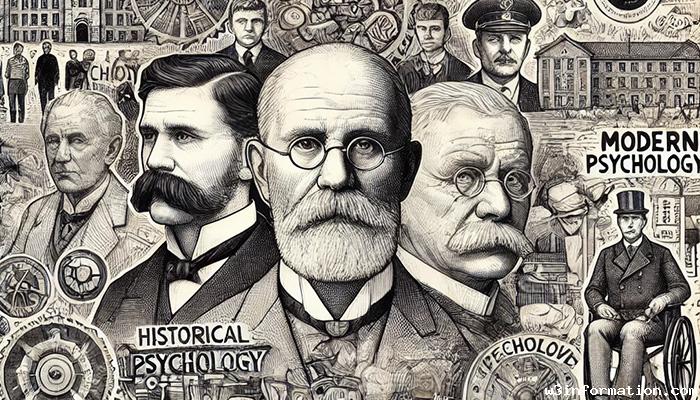How Historical Events Shaped Modern Psychology
The history of psychology as we know it today has been shaped by various historical events which have left enduring marks on our understanding of human mental processes and behavior. The blog examines essential historical events that influenced psychology's development starting from ancient philosophical questions through significant findings in the 20th and 21st centuries.
Ancient Foundations of Psychological Thought
Early Philosophical Influences
Ancient Greece
The foundational understanding of mental processes originated from the work of philosophers such as Socrates, Plato, and Aristotle. The enduring debates on nature versus nurture emerged from Plato's innate knowledge theory alongside Aristotle's empirical observations.
Eastern Philosophies
Buddhism and Confucianism from Eastern traditions fostered introspection and mindfulness while highlighting mind-body connections which shaped modern psychological techniques.
The Mind-Body Connection
Early psychological thought focused heavily on the mind-body relationship which experienced a crucial philosophical transformation through René Descartes' dualism.

The Emergence of Psychology as a Science
Wilhelm Wundt established experimental psychology through the founding of the first psychology laboratory in Leipzig, Germany in 1879.
The establishment of Wilhelm Wundt's psychology laboratory in Leipzig, Germany during 1879 served as the critical point where psychological investigation moved from philosophical thought to scientific research.
Structuralism and Functionalism
Structuralism: Edward Titchener concentrated on analyzing mental processes by deconstructing them into their fundamental components.
Functionalism: William James investigated how mental processes serve the function of helping individuals adapt to their surroundings.
Key Historical Movements in Psychology
Psychoanalysis
The late 19th century saw Sigmund Freud establish psychoanalysis which transformed perceptions of unconscious mental processes along with childhood development and mental health.
Behaviorism
John B. Watson and B.F. Skinner directed psychology toward empirical study methods through their early 20th-century focus on observable behaviors and environmental factors.
Humanistic Psychology
In the mid-20th century Carl Rogers and Abraham Maslow developed humanistic psychology which emphasized individual potential and self-actualization along with holistic well-being.
Historical Events Impacting Psychology
World Wars
World War I: The development of psychological assessments like the Army Alpha and Beta tests demonstrated military settings' requirement for applied psychology during their inception.
World War II: The war accelerated progress in clinical psychology and PTSD research while demonstrating how psychological principles could enhance propaganda efforts and boost morale.
The Civil Rights Movement
Research on prejudice and systemic inequalities expanded social psychology’s domain when equality and social justice movements gained momentum.
The Cognitive Revolution
Mid-20th century technological innovations such as computers and information theory redirected scientific attention to cognitive mechanisms including memory, perception, and decision-making which presented a challenge to behaviorist approaches.
Contributions from Diverse Cultures and Perspectives
Multicultural Psychology
The development of multicultural psychology stemmed from recognizing cultural diversity as a critical factor that shapes mental processes and behavioral patterns.
Feminist Psychology
Advocates of feminist movements exposed gender biases present in research and theory while pushing for more inclusive and equitable research methods.
Indigenous Psychology
Indigenous perspectives brought new depth to psychological knowledge through their focus on community bonds and spiritual and ecological relationships.
Advances in Technology and Neuroscience
Brain Imaging Technologies
Brain activity studies transformed through fMRI and PET scans which connected neural processes to behavior patterns.
Artificial Intelligence and Machine Learning
Psychological research has seen significant advances through AI's impact which includes cognitive process modeling and therapeutic intervention improvement.
Psychology’s Role in Contemporary Issues
Mental Health Advocacy
Worldwide initiatives that fight against mental health stigma have broadened healthcare access and created changes in public policy.
Environmental Psychology
The increasing awareness of environmental issues has prompted investigations into how humans interact with their environment and how they can adopt sustainable practices.
Digital Age Challenges
The emergence of social media and digital dependence along with online communication has generated novel research fields within cyberpsychology.
Conclusion
The development of modern psychology into a structured scientific field has been deeply influenced by historical events which transformed its origins from philosophical speculation. Gaining insight into historical milestones reveals how past events shaped psychological progress while opening pathways for innovative developments.
 DIY Holiday Decor Ideas on a Budget
DIY Holiday Decor Ideas on a Budget
 How to Create a Healthy Meal Plan for the Week
How to Create a Healthy Meal Plan for the Week
 Discover your top 10 comforting meals to enjoy during the winter season
Discover your top 10 comforting meals to enjoy during the winter season
 Tips for Stress-Free Holiday Travel
Tips for Stress-Free Holiday Travel
 Mobile Video Editing Apps to Try
Mobile Video Editing Apps to Try
 Mobile Health Apps: Best of 2025
Mobile Health Apps: Best of 2025